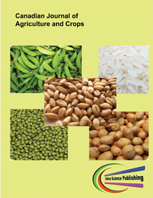Climate Change Impacts on Agriculture and Adaptive Strategies of the Farming Community in Offa Woreda, Wolaita Zone SNNPR
DOI:
https://doi.org/10.20448/803.1.2.50.59Keywords:
Climate, Additive strategy, Agriculture, Climate shock, Drought tolerant.Abstract
Agriculture is the sector mainly susceptible to the climate change impact. Climate change shock is more sever in the countries like Africa, where agriculture is for the daily survival, and where adaptive potential is low. Therefore, it is essential to increase the understanding of the real climate change dynamics on agricultural tricks and on the societies at the lower levels. This study uses the Offa Woreda, Wolaita Zone in southern Ethiopia and examines the local climatic trends and its shock on the agriculture in the region. The study uses semi-structured interview, structured questionnaire and FGDs to collect data from local society, and government experts, whereas the secondary data collected from published and unpublished materials, and systematically analyzes by using quantitative analysis. The result shows that the trend of gradual and extreme weather change has unenthusiastic shock on the agricultural tricks in almost all selected households in the study area particularly low land but has a positive role in some midland kebeles where agriculture was constrained by low temperature. To adapt the shock, societies use diversification, drought tolerant varieties, early maturing varieties, disease resistance varieties, mulching, flood control measures, irrigation, water harvesting, start trading, and family planning. Awareness raising, credit, dissemination of technology and provision of safety nets to some lowlanders are among the coping/adaptive strategies provided by the government institution, but not sufficient and sustainable to cope/adapt with climatic variation vagaries. Though most households in the selected kebeles of the study area are vulnerable to climatic crisis, the severity is acute for the poor, landless, children, women, large sized family.


